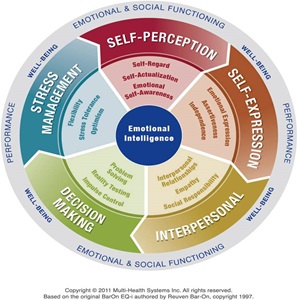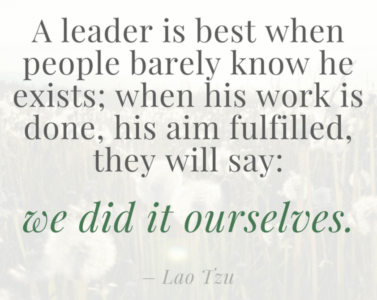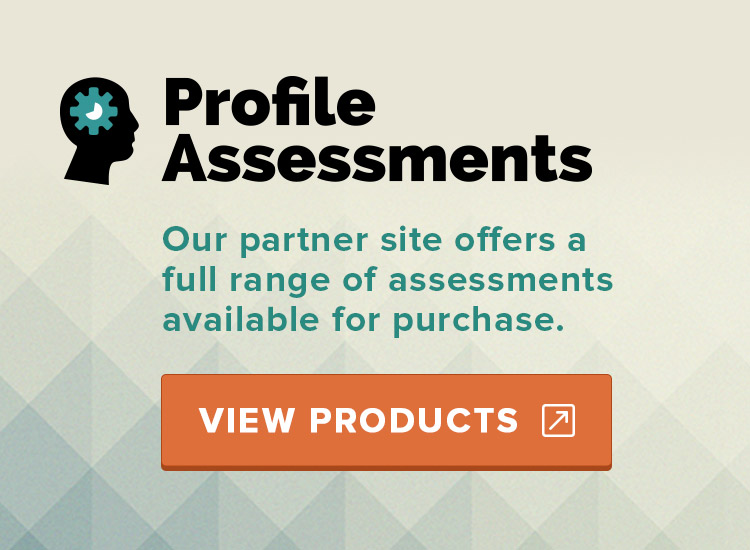Leadership EQ
Why is Emotional Intelligence Critical to Success?
 Leadership EQ is the key difference in what makes good versus great leaders. The best leaders are those that are aware of how emotions impact behaviors. Increasing EQ personal and social awareness sets a strong foundation for authentic communications and effective collaboration.
Leadership EQ is the key difference in what makes good versus great leaders. The best leaders are those that are aware of how emotions impact behaviors. Increasing EQ personal and social awareness sets a strong foundation for authentic communications and effective collaboration.
Try this! Think about a manager that really stands out as someone who you would consider a mentor – an influential leader. Now, think about another manager that you didn’t like, or challenging to work with. What characteristics did you observe in each example?
What is Emotional Intelligence?
Emotional Intelligence is an individual’s ability to perceive and understand their emotions as well as the emotions of others. Leaders who have developed this skill positively impact an employee’s career, well-being, and self-confidence. They are great listeners and consider the opinions of others. These leaders are open to different approaches and seek to understand from their team members.
Low Emotional Intelligence can be very destructive. Unfortunately, it’s all too common in today’s workplace. Emotions can trigger reactions that are disrespectful and erode trust. Ask yourself how you respond to situations that trigger emotions in ways that work against you.
For example:
- You snap back and say something that you later regret
- You stop listening and instead start thinking about your response
- You become inflexible and drive to closure without considering another’s input
- You get heated during conflict and defend your plan.
Let’s assume that most employers can assess a person’s technical skills to perform a specific job. It’s the behaviors that are more challenging to assess – and these are what drive emotional intelligence.
EQ-i2.0 Model of Emotional Intelligence for Leaders
The EQi2.0 model helps leaders to gain an understanding of where they rank among the highest performing leaders. Leaders who commit to developing their EI skills are those that truly make a positive impact in today’s workplace. The good news is that unlike IQ, Emotional Intelligence can be improved with consistent and conscious effort over time.
Using the EQ-i2.0 Model of Emotional Intelligence for Leaders, let’s look at the five composite areas that drive behaviors and distinguish great leader’s vs good leaders.
 Self-Perception
Self-Perception
This measures the Inner Self. How well does an individual understand what, when, why, and how different emotions impact thoughts and actions? Those that react to situations without thinking likely have little awareness of how their emotions show up.
The first step for a leader is to develop their Emotional Self-Awareness – to learn to differentiate between their own emotions, and the impact they have on the thoughts and actions of oneself and others.
Self-Expression
This is an extension of Self-Perception. It addresses the outward expression of the action component of one’s internal perceptions. Individuals who communicate without awareness of how their actions might be perceived are those with a lower level of Emotional Intelligence.
Leaders that consciously take a moment of pause and consider how they will express themselves, will have the ability to communicate feelings in a constructive and socially acceptable way.
Interpersonal
Once a strong foundation of awareness and expression is in place, the next step is to examine Interpersonal Relationships. In today’s fast pace, it’s a challenge to nurture interpersonal interactions. It takes time and dedication. By doing so, the rewards are great, and efficiencies are a given.
To build trust and collaboration, it’s essential to develop the ability understanding another’s perspective AND demonstrate empathy by authentically putting oneself in the others shoes. Employees respond very well to leaders that take the time to listen and understand.
Decision-Making
This is how we use our emotional information to problem solve and work towards quality decisions. Those with a lower EQ may act on impulse and pursue unrealistic alternatives that results with ineffective problem-solving.
Leaders with higher emotional intelligence can manage emotions and remain objective by seeing things as they are. They can resist or delay an impulse, drive, or temptation and avoid rash behaviors and decision making.
 Stress Management
Stress Management
Awareness of how we cope when challenged is critical to managing effectively and respectfully. When stress is high and time is short, ineffective leaders may become rigid, resist change, and keep with the status quo.
Those that demonstrate high emotional intelligence under stress will remain flexible, lead or influence situations in a positive manner, and remain hopeful and resilient despite occasional setbacks.
The bottom line is to become a great leader, you must commit to developing emotional intelligence. Those that do, will stand out as someone who you would consider a mentor – the greatest and most influential leaders.
Evaluate your Emotional Intelligence with the EQi2.0 Leadership assessment and receive a complementary debrief of your results. 
